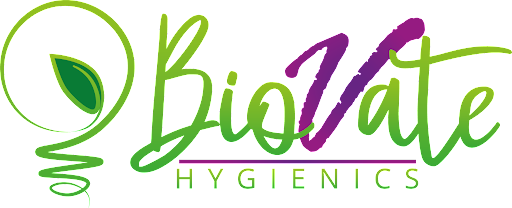
Biovate Hygienics have pioneered the migration to sustainable cleaning products for the past decade,
using the power of nature's biological cleaning actives.

Bio-enzymes are the main ingredient in the BioVate product line, but what exactly are these "bio-enzymes"?
To put it simply, bio-enzymes are substances produced by "good" bacteria - the cleaning products BioVate manufacture use a specific ratio of these bacteria to create a safe and effective cleaner. The bacteria used in these products is known as LAB (Lactic Acid Bacteria). The lactic acid bacteria are a group of gram-positive bacteria, non-respiring non-spore-forming, cocci or rods, which produce lactic acid as the major end product of the fermentation of carbohydrates.
While using bacteria to clean may sound strange, and perhaps counter-productive to some people, it is in-fact much safer than using your standard synthetic chemicals. Lactic acid bacteria (LAB) are one of the most significant groups of probiotic organisms, meaning that they are actually good for your body. They are present in many foods but are most commonly found in fermented dairy products such as yoghurt.
Despite its confusing name, lactic acid manufactured for commercial use is vegan, and is a natural by-product of the decomposition process of carbohydrates.
 But how does it clean?
But how does it clean?
Lactic acid bacteria produce the following antimicrobial substances:
- Acetic acid – The acid in white vinegar and a natural all-purpose cleaning agent
- Hydrogen peroxide – A non-toxic yet powerful disinfectant
- Antifungal compounds
- Bacteriocins – Antimicrobial proteins used in chemical-free food preservation
Because of this, lactic acid can inhibit the growth of dangerous microorganisms on foods, surfaces, and skin.
Bio-enzymes like LAB are also highly effective against odour causing bacteria, and in many cases can provide instant odour relief. Because of the nature of the bacteria, it’s easy for them to get deep into hard to reach areas like fabrics.
Lactic acid is effective against gram negative bacteria, which are generally resistant against antibiotics and the body's immune cells. Lactic acid can inhibit the growth of the following:
- Salmonella typhimurium – A major pathogenic bacteria that cause food poisoning
- Escherichia coli – A bacteria found in contaminated food that can damage the lining of the small intestine
The United States Environmental Protection Agency (EPA) listed lactic acid as an active ingredient in disinfectants that are effective against the following viruses:
- Rhinovirus – A virus that causes the common cold
- Certain types of human coronavirus
- Feline calicivirus – A virus that causes a respiratory infection in cats and is highly contagious, though it cannot be passed to humans
Microbes consumed by LAB are converted into two basic compounds, CO2 and H2O, with no other residue left behind.
Because bacteria reproduce, bio-enzyme cleaners will continue to work on surfaces for up to 80 hours, or until their food source runs out, meaning they are an effective way to provide long-term protection on your surfaces and touch points.
How does it help the planet?
By using lactic acid in their cleaners, BioVate are able to cut out most synthetic chemicals from their products, most notably petrochemicals which struggle to decompose under normal circumstances.
Equally, as lactic acid is a substance found in nature, it will not affect or contaminate the ecosystem.
Lactic acid is produced through the decomposition process of plants, meaning that it is a naturally occurring substance and does not require the same amount of pollution-inducing factory processing that other chemicals do.
BioVate also ensure that all packaging and containers used are as recyclable as is practically possible. Containing 30% PCR plastic in 5L containers and trigger bottles, whilst the 1.5L pouches contain 72% less plastic by weight than a 5L container.
Where applicable the range meets the Ecolabel standards for biodegradability.
If you want to learn more about BioVate Hygienics you can view our range here or visit their website.


